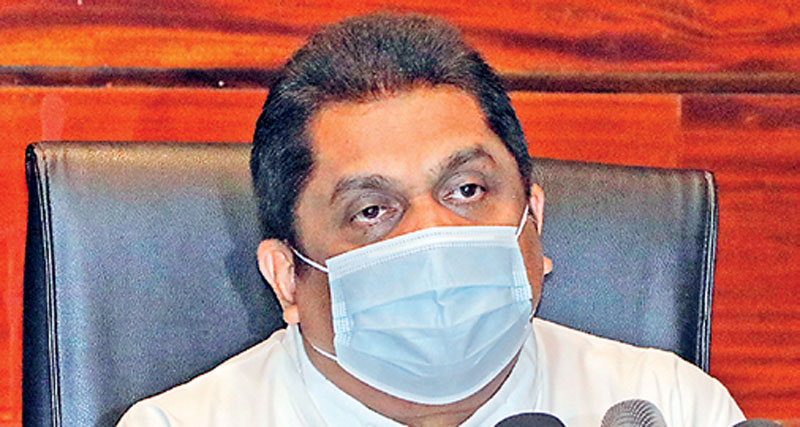Tuesday Feb 24, 2026
Tuesday Feb 24, 2026
Saturday, 9 October 2021 00:24 - - {{hitsCtrl.values.hits}}

Cooperative Services, Marketing Development and Consumer Protection State Minister Lasantha Alagiyawanna
The Government yesterday justified the relaxation of the earlier Maximum Retail Price (MRP) on four items on the basis of ensuring uninterrupted supplies and avoid financial difficulties for manufacturers.
A special Cabinet meeting on Thursday night chaired by President Gotabaya Rajapaksa took the decision to revoke existing MRPs on full-cream milk powder, wheat flour, LPG and cement.
Cooperative Services, Marketing Development and Consumer Protection State Minister Lasantha Alagiyawanna said the new MRP will be announced after the earlier gazettes are revoked. There had been discussions with manufacturers and importers yesterday to reach a consensus on a fair price.
The latest development follows months of price control mechanisms, shortage of commodities, raids to counter hoarding of goods and futile efforts of negotiations with the food importers.
The State Minister emphasised that President Rajapaksa and Trade Minister Bandula Gunawardena had instructed strict monitoring of new prices, to ensure there was no exorbitant price hike or shortage of goods in the market.
Alagiyawanna said by next week, more stocks would be available in the local markets adding that a request will be made to suppliers and producers to ensure there was no shortage of goods in the market.
“We understand that the price controls had an impact on the markets which led to a scarcity of essential items,” he said.
The State Minister also said that authorities had also been advised to ensure that traders do not sell goods at exorbitant prices, in the absence of a control price.
He assured that the Government would make the necessary intervention if unfair prices were imposed on products inconveniencing the general public.
“A kilo of milk powder will come below Rs. 1,295,” Milk Powder Importers Association member Lakshman Weerasuriya told Daily FT after the meeting with State Minister Alagiyawanna.
He said the State Minister did not agree to increase a kilo of milk powder by Rs. 350, explaining the current economic condition and the burden it would have on the consumers.
“We only requested the Government to increase the price to match the difference of the foreign exchange rate and to cover the cost of production. I think it is fair to the producer as well as the consumer,” Weerasuriya said.
He said they could maintain a certain price as long as the Finance Ministry did not impose any further taxes. The milk powder importers have only slapped a value-added tax (VAT) at present.
He pointed out that local milk powder producers could maintain the same price levels, as they do not have freight charges and exchange rates included in their cost of production.
According to him, eight litres of liquid milk was required to produce a kilo of milk powder and it cost around Rs. 2,400.
LPG suppliers Litro and LAUGFS, too, had been clamouring for a fair hike given spikes in global markets. Litro said the global price of LP gas increased to an unprecedented amount of $ 800 per ton on 1 October 2021. “When converted directly to a 12.5 kg cylinder, the cost of the product adds up to Rs. 2,021. However, at present, the price of a 12.5 kg Litro gas cylinder is set at Rs. 1,493, and once the shipping, insurance and other necessary costs are taken into account, the additional cost of manufacturing a 12.5 kg LP gas cylinder amounts to Rs. 700,” Litro sources said.
Accordingly, the cost of manufacturing a 12.5 kg LP gas comes up to Rs. 2,800. As a result, Litro Gas Lanka would be compelled to increase the price of a domestic gas cylinder to Rs. 2,800 in order to cover the cost of purchase, shipping, insurance and other necessary expenses.
The decision to not increase gas prices parallel to cost fluctuations during the past nine months resulted in a loss of Rs. 10.5 billion for Litro Gas Lanka, sources added.